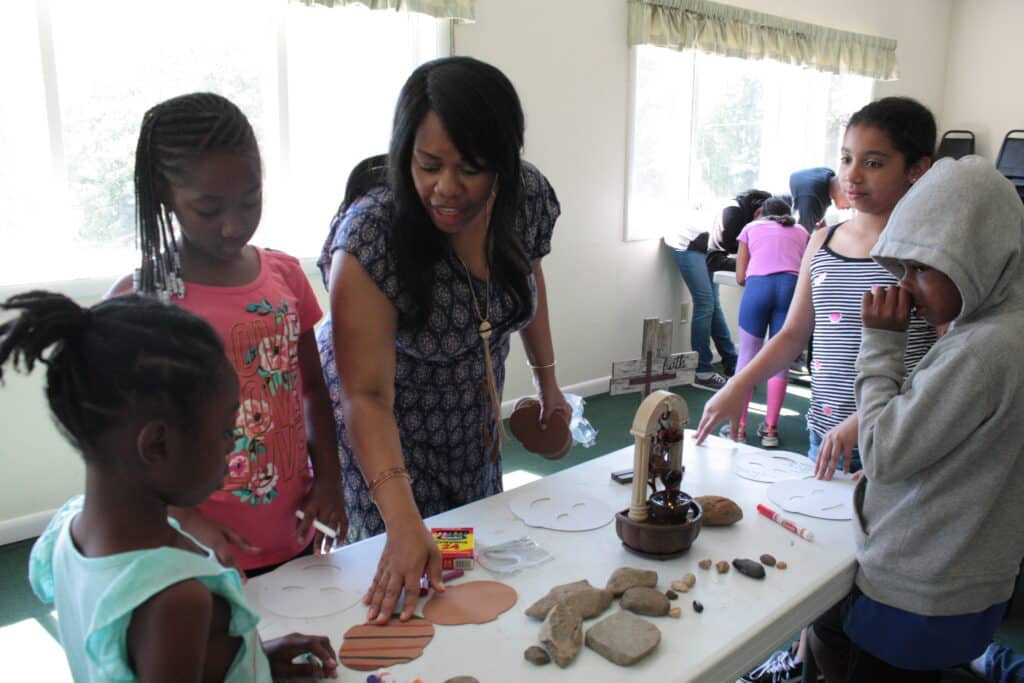A Place on the Hill
I began my journey with Camp Deerpark as a camper at 9 years old. My church was Burnside Mennonite Church, now called King of Glory Tabernacle. Camp Deerpark was one of the church’s outreach programs of the late ’70s. I remember I didn’t particularly enjoy camp in my early days, but as a teen camper it became a motivational place, a place that meant transformation and symbolized victory.
Because of my experience as a camper, I became an adult leader who is very intentional about creating safe spaces where God dwells. At the age of 14, I was one of three staff members who pioneered the first pilot CIT(Counselors in Training) program at Camp Deerpark. The other two staffers were Richard Pannell and Carmela Arnold. This was also around the time that Ken Bontrager came on board as director. We created activities and a mission fiercely centered on community and encountering Christ in ways that were relevant to the youth. My personal mantra and challenge shifted to: “What can I do to create community?” This would hold true even as I moved into more senior roles at Camp Deerpark. I even credit camp with giving me the stamina and passion I needed to prepare to be a pastor.
Camp became a place on the hill—this hill being a space that is a sanctuary, a euphoric space to explore and develop community. It is a place I regarded as the systematic development of spiritual growth, providing training and practicum for leadership. Everybody who was a part of that core crew of CIT’s went on to become leaders in their communities. Ten days of summer camp was more impactful than a year of Sunday school! This is important work, especially since we are not making space in our schools to develop faith. The challenge and even struggle is how do we take what we learn in spaces like camp and create microcosms of that? How do we create spaces to grow and develop in God in the city?
This is why Discipleship Camp at Camp Deerpark was so powerful. That group was intentional about creating safe, authentic communities and using camp to bring people into common platforms. My journey was blossoming and advancing with each new chapter of my Camp Deerpark story. I was learning to be a compassionate leader with a heart for people. As a Camp Deerpark program director I was intent on giving staff and campers freedom to develop, make mistakes and use those blunders as opportunities to grow. There was a lot of grace extended to people to use gifts that were just being discovered. The grace was the process! So often people hoard space and are territorial, and camp is not like that. Sometimes in our communities we put limits on what people can do and what role that should play. At Camp Deerpark gifts were called out and nurtured. Camp helps take the limits off because you say, “I did this at camp; I can do this in my community.”
I remember one of my first levels of conversion. It was with youth leaders, Daryl and Monique Wansley, at campfire on the top of the hill. Daryl talked about sacrifice, and I was feeling so convicted. I recall saying to myself,“ God wants a personal relationship with me. I can’t get it just because of my father, who was a bishop.”
In that moment I had an encounter with Habakkuk 3:18–19: “yet I will rejoice in the Lord, I will be joyful in God my Savior. The Sovereign Lord is my strength; he makes my feet like the feet of a deer, he enables me to tread on the heights.” (NIV) I had this vision of a deer leaping and felt purposed by God. Camp is that space; camp is that hill where you will hear from God!
—Written by Veronica Dingwall, camper, counselor, summer camp director 2009, board member 2016–2018, attends King of Glory Tabernacle in the Bronx.
Hyacinth Stevens, program director, 1997–1999 and 2002–2005, pastor of King of Glory Tabernacle in the Bronx.
Related Entries
Share:
Sorry, we couldn't find any posts. Please try a different search.

